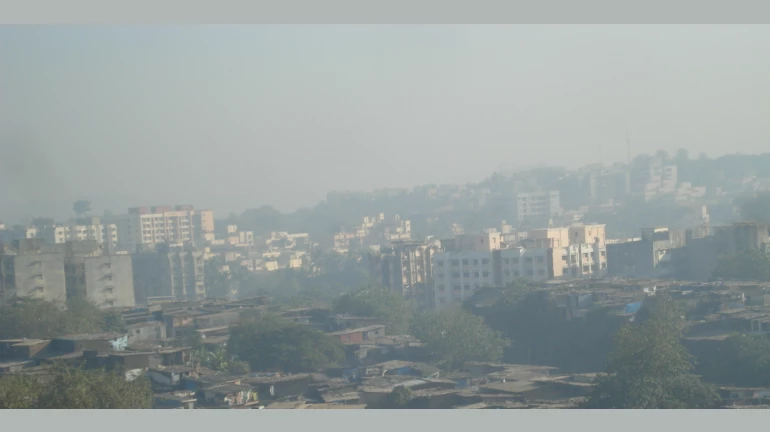
In a first of its kind campaign, concerned citizens, civil society organisations across Maharashtra have demanded that Urban Local Bodies (ULB) mandatorily issue timely health advisories publicly, to alert citizens on ‘bad air’ days, which will help save vulnerable groups from severe health impacts of air pollution.
The joint call to action comes from non-attainment cities like Mumbai, Pune, Nagpur, Chandrapur and others reeling under poor air quality, and not just during winters.
Bad air days are when the air quality index (AQI) - pollutant measuring indicator - rises beyond the safe limit for any location falling either under the poor, very poor or hazardous AQI levels.
The online campaign has been initiated on September 7, which marks the International Day of Clean Air for Blue Skies. In its second year since its inception, the theme for 2021 is ‘Healthy Air, Healthy Planet’, which emphasizes the health aspects of air pollution, especially considering the coronavirus pandemic.
Maharashtra has a total of 19 non-attainment/ million-plus cities under the National Clean Air Action Plan (NCAP), the highest for any state in the country. A non-attainment city is one that does not meet the prescribed air quality standards set by the Union environment ministry.
Bhagwan Kesbhat, Founder of Mumbai based Waatavaran Foundation and member of Maharashtra Clean Air Collective- a collaborative network of organizations, individuals, institutions working towards the common objective of clean air said that this is a pan India citizen-led online campaign. “Using this online petition, citizens will be demanding timely public health advisories be issued widely in the mainstream public domain so that we all can not only protect ourselves but also our loved ones when the air quality in the city deteriorates. The campaign also demands proper implementation of the Clean Air Action Plan across all 18 non-attainment cities,” stated Kesbhat.
He added that the citizen’s groups across Maharashtra want the government to know that they are aware of the time-bound action points listed under the Clean Air Action Plan for their respective cities.
“As part of this campaign, citizen groups across all non-attainment cities in Maharashtra will also meet their respective Municipal Commissioners and submit a letter stating the demand of health advisory when air quality deteriorates,” said Keshbhat.
The online petition is also being shared widely on social media and WhatsApp groups and already over 15 organisations across Maharashtra have actively supported this campaign. Citizen organisations across Maharashtra that are supporting and have already signed the petition are also planning to spread awareness.
Nagpur-based Leena Buddhe, who heads the Centre for Sustainable Development (CFSD), stated, “Being surrounded by coal-fired power plants the air quality is seen to deteriorate in both summer and winter but most of the citizens are unaware about the AQI levels or the health impacts of being exposed during peak pollution hours. The health advisories will benefit all, especially senior citizens and children who go for early morning walks, cycling or running in areas that are highly polluted,” she said.
The recent Air Quality Life Index (AQLI) released by the Energy Policy Institute at the University of Chicago (EPIC) for 2019 revealed that the national average reduction in lifespan due to PM 2.5 was four years in Maharashtra. City wise PM2.5 exposure was reducing life expectancy by 4.2 years in Pune, 3.7 years in Mumbai while for several polluted districts in Vidarbha it was found to be five years.
Meanwhile, Prof Yogesh Dudhpachare of Green Planet Society in Chandrapur said that given that it has always been one of the most polluted cities in Maharashtra the local municipal corporation should have more air quality monitors. “Air quality needs to be not only measured but also displayed in simple-to-understand graphics across prominent locations of Chandrapur city. The Municipal Corporation should also send out alerts to people on days when air quality severely deteriorates,” he said.
Stating that the AQI was created to make the general public aware Dipankar Saha, Former Additional Director, Central Pollution Control Board (CPCB) said, “Urban local bodies must issue health warnings when the AQI for a certain region crosses the safe limit to ensure the public can take appropriate decisions to protect themselves. It has to be a mandatory requirement for all. Thus the National Clean Air Program (NCAP) has its focus right at the ULB level.”
Several studies have already shown the impacts of air pollution on not only respiratory organs but also brain and even reproductive organs. Recently a first pan-India study conducted by scientists from four institutes across the country found a direct correlation between air pollution. The study stated that areas with poor air quality and higher emissions of particulate matter (PM) 2.5 are more likely to have COVID-19 infections and related deaths.
Divya Narayanan, Campaigns Director for Jhatkaa.org, which has created the portal for the citizen's campaign said that the pandemic had forced us all to seek out as much information as possible to safeguard our health and of our loved ones against the virus. “In the same manner, we must realise that we need to demand more information to be made widely available about the air we breathe, and its effects on our health. It's all the more important now in light of COVID-19, that we have information widely made available to us so we can make learning choices for our health on bad air days,” she said.





